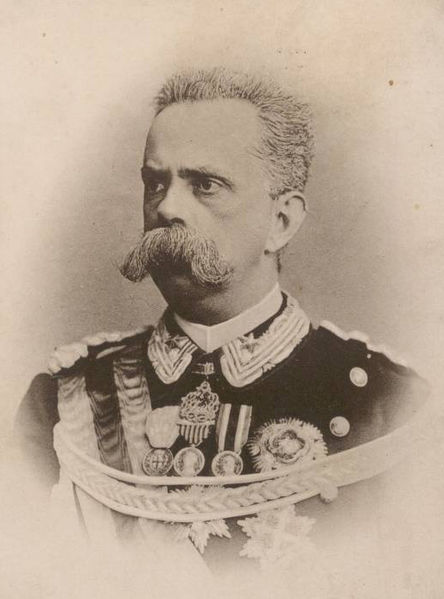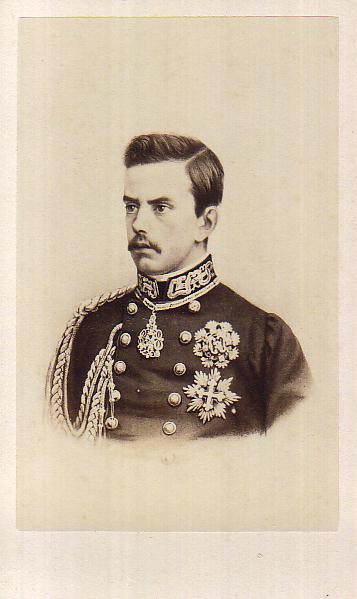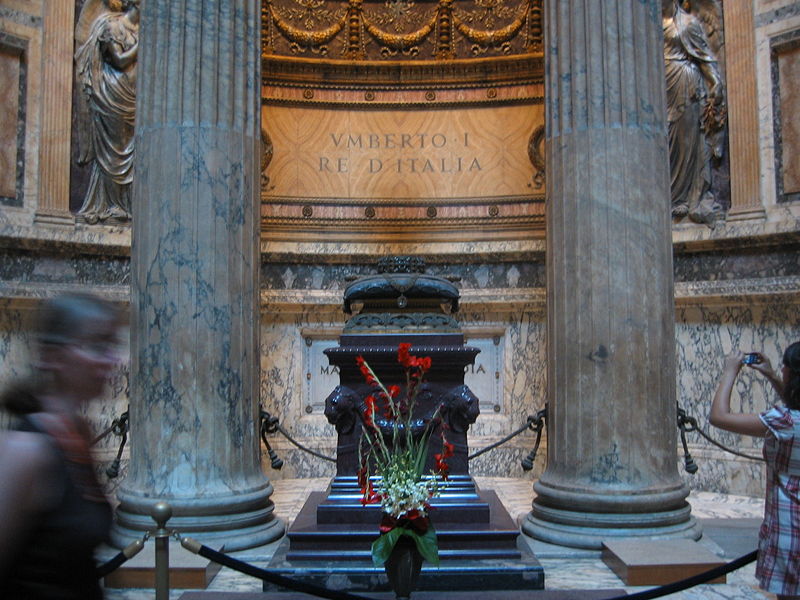<Back to Index>
- Mathematician Wacław Franciszek Sierpiński, 1882
- Painter Ferdinand Hodler, 1853
- King of Italy Umberto I, 1844
PAGE SPONSOR


Umberto I (Umberto Ranieri Carlo Emanuele Giovanni Maria Ferdinando Eugenio di Savoia; 14 March 1844 – 29 July 1900), nicknamed the Good (il Buono), was the King of Italy from 9 January 1878 until his death. He was deeply loathed in far-left circles, especially among anarchists, because of his conservatism and support of the Bava-Beccaris massacre in Milan. He was killed by anarchist Gaetano Bresci two years after the incident.
The son of Victor Emmanuel II and Archduchess Maria Adelaide of Austria, Umberto was born in Turin, which was then capital of the kingdom of Sardinia, on 14 March 1844. His education was entrusted to, amongst others, Massimo Taparelli, marquis d'Azeglio and Pasquale Stanislao Mancini.
From March 1858 he had a military career in the Sardinian army, beginning with the rank of captain. Umberto took part in the Italian Wars of Independence: he was present at the battle of Solferino in 1859, and in 1866 commanded the XVI Division at the Villafranca battle that followed the Italian defeat at Custoza.
Because of the upheaval the Savoys caused to a number of other royal houses (all the Italian ones, and those related closely with them, such as Bourbons of Spain and France) in 1859-60, it was only a scarce number of royal families which in the 1860s were willing to be in relations with the newly established Italian royal family. It proved difficult to find any royal bride for either of the sons of king Victor Emmanuel II. (His younger son Amedeo, Umberto's brother, married ultimately a Piedmontese subject, princess Vittoria of Cisterna). Their conflict with the papacy did not help these matters. Not many eligible catholic royal brides were easily available for young Umberto. At first, Umberto was planned to be engaged with Archduchess Mathilde of Austria, a scion of a remote sideline of the Austrian imperial house; however, she died as the result of an accident at the age of 18. On 21 April 1868 Umberto married his first cousin, Margherita Teresa Giovanna, Princess of Savoy. Their only son was Victor Emmanuel, prince of Naples; later Victor Emmanuel III of Italy. She was one of the rare young ladies of any royal house available to the despised Savoy royal family in that decade - being a Savoy herself.
Ascending the throne on the death of his father (9 January 1878), Umberto adopted the title "Umberto I of Italy" rather than "Umberto IV" (of Savoy), and consented that the remains of his father should be interred at Rome in the Pantheon, rather than the royal mausoleum of Basilica of Superga.
While on a tour of the kingdom, accompanied by Premier Benedetto Cairoli, he was attacked by an anarchist, Giovanni Passanante, during a parade in Naples on 17 November 1878. The King warded off the
blow with his sabre, but Cairoli, in attempting to defend him, was
severely wounded in the thigh. The would-be assassin was condemned to death, even though the law only allowed the death penalty if the King was killed. The King commuted the sentence to one of penal servitude for
life, which was served in conditions in a cell only 1.4 meters high,
without sanitation and with 18 kilograms of chains. Passanante would
later die in a psychiatric institution, after torture had driven him insane. The incident upset the health of Queen Margherita for several years. In foreign policy Umberto I approved the Triple Alliance with Austria-Hungary and Germany, repeatedly visiting Vienna and
Berlin. Many in Italy, however, viewed with hostility an alliance with
their former Austrian enemies, who were still occupying areas claimed
by Italy. Umberto was also favorably disposed towards the policy of colonial expansion inaugurated in 1885 by the occupation of Massawa in Eritrea. Italy expanded into Somalia in
the 1880s as well. Umberto I was suspected of aspiring to a vast empire
in northeast Africa, a suspicion which tended somewhat to diminish his
popularity after the disastrous Battle of Adowa in Ethiopia on 1 March 1896. In the summer of 1900, Italian forces were part of the Eight Nation Alliance which participated in the Boxer Rebellion in Imperial China. Through the Boxer Protocol, signed after Umberto's death, the Kingdom of Italy gained a concession territory in Tientsin. The reign of Umberto I was a time of social upheaval, though it was later claimed to have been a tranquil belle époque. Social tensions mounted as a consequence of the relatively recent occupation of the kingdom of the two Sicilies, the spread of socialist ideas, public hostility to the colonialist plans of the various governments, especially Crispi's, and the numerous crackdowns on civil liberties. The protesters included the young Benito Mussolini, then a member of the socialist party. During
the colonial wars in Africa, large demonstrations over the rising price
of bread were held in Italy and on 7 May 1898 the city of Milan was put under military control by General Fiorenzo Bava-Beccaris, who ordered the use of cannon on
the demonstrators; as a result, about 100 people were killed according
to the authorities (some claim the death toll was about 350); about a
thousand were wounded. King Umberto sent a telegram to congratulate
Bava-Beccaris on the restoration of order and later decorated him with
the medal of Great Official of Savoy Military Order, greatly outraging
a large part of the public opinion. To a certain extent his popularity was enhanced by the firmness of his attitude towards the Vatican,
as exemplified in his telegram declaring Rome "untouchable" (20
September 1886), and affirming the permanence of the Italian possession
of the "Eternal City". Umberto I was attacked again, by an unemployed ironsmith, Pietro Acciarito,
who tried to stab him near Rome on 22 April 1897. Finally, he was
murdered with four revolver shots by the Italo-American anarchist Gaetano Bresci in Monza, on the evening of 29 July 1900. Bresci claimed he wanted to avenge the people killed during the Bava-Beccaris massacre. He was buried in the Pantheon in
Rome, by the side of his father Victor Emmanuel II, on 9 August 1900.
He was the last Savoy to be buried there, as his son and successor Victor Emmanuel III died in exile and is still buried in Egypt. A newspaper report of Bresci's attack was carried and frequently read by the American anarchist Leon Czolgosz; Czolgosz used the assassination of Umberto I as his inspiration to murder U.S. President William McKinley in September, 1901 under the banner of Anarchism.
